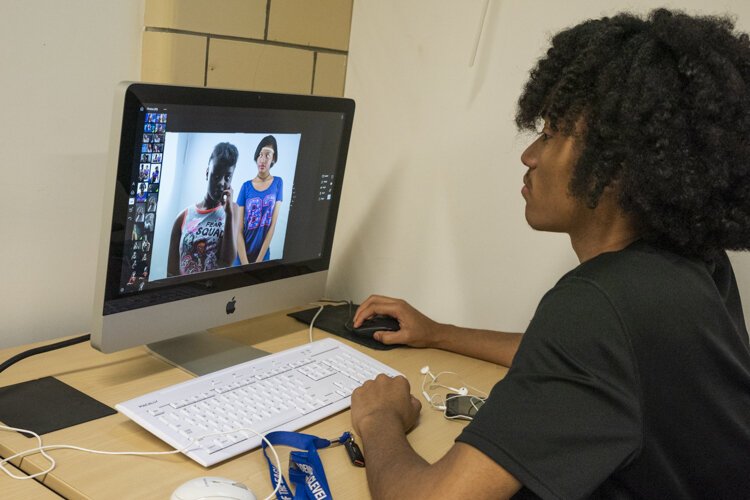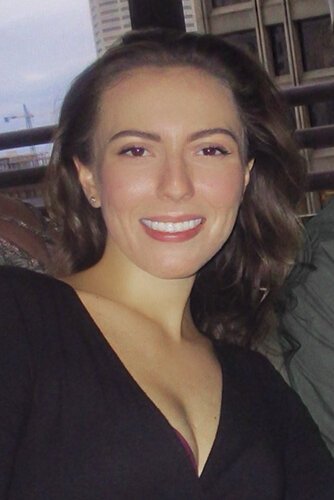How online learning is going for Cleveland-area college students
 Bob PerkoskiOnline learning, a high-tech approach to higher education.
Bob PerkoskiOnline learning, a high-tech approach to higher education.
College campuses have closed due to the coronavirus, replaced where possible by laptop learning, which comes with its own set of problems. We asked three FreshWater Cleveland contributors who are in college to give us their personal perspective on this new high-tech form of higher education.
 Evey WeisblatEvey Weisblat
Evey WeisblatEvey Weisblat
Weisblat lives in Cleveland Heights, graduated from Laurel School, and is a junior at Kenyon College, where she is senior news editor for the student newspaper, the Kenyon Collegian. In August, she wrote about Randell McShepherd's City Club speech for FreshWater Cleveland.
As colleges and universities across the country move online in the wake of the COVID-19 pandemic, professors and students alike are grappling with how to conduct education outside the classroom. For some, this means simply going about business as usual via multiperson video chat platforms like Zoom or Google Meet. For others, the change entails completely overhauling syllabuses and established standards of grading.
I like to believe that in-person classes grant a particular intimacy to learning that is difficult, if not entirely impossible, to capture across multiple time zones and locations. Try to imagine Aristotle and Plato discussing the nature of virtue over a Zoom meeting. It’s just not sexy. On the other hand, shouldn’t we be used to this by now? Aren’t our lives already so entrenched in the virtual world that online learning should be, well, par for the course? As it turns out, the answer is a resounding yes and no.
First of all, it’s awkward. As students and educators, we are sailing together in uncharted waters, and it’s painfully obvious. Typical classroom standards — such as raising your hand to answer a question — are being turned inside out. In my film class of 30 students, my professor has settled on what I’ll call the “free for all” model, where anyone can shout out the answer. While I believe this style can be beneficial with smaller class sizes, with dozens of people on a call you wind up with constant interruptions, followed by profuse apologies (“You go!” “No, you go!”), exaggerated awkward silences and, worst of all, even more airtime for the kid who thinks he’s the one with the advanced degree.
Then there’s the problem of having to go. What do you do when you have to, err, use the little girl’s room? Typically, I mute my mic, turn off my camera, and hope not to be spontaneously called on, but I’ve seen videos of students legitimately asking their professors midlecture if they can go to the bathroom. It’s as if we’ve reverted back to asking our teachers to let us take a dump. Yikes.
But it doesn’t end there. Professors, let’s be honest, are Luddites when it comes to technology. In one class, I felt so bad that my professor couldn’t figure out how to see all the students on his screen that I put a message in the chat with instructions (spoiler alert: he didn’t see it).
A friend told me her professor had the camera off the entire time she was teaching, so the students followed suit. Countless TikToks show students pretending to be frozen in order to get out of a presentation during class, or videoing themselves on their phones so it looks like they’re in class.
Still, I can’t help feeling a little bad when professors buy into these conniving Gen-Z tactics. Sure, it’s funny to see these professors flail about like students cramming for a midterm, but in reality, such technology troubles raise interesting questions about the sustainability and training required to maintain online learning indefinitely—or even for another six months. All jokes aside, this sudden shift to online instruction has serious implications for the present and future state of education. One thing that’s come up again and again, as my college has attempted to adapt its grading policy for remote education, is the question of accessibility. Who has access to the necessary resources—and who doesn’t—is now, perhaps more than ever before, becoming increasingly clear.
If a student doesn’t have enough to eat at home, can they really be expected to produce the same quality work as before? And what about students who need to work 60-plus hours a week to support their families? What if they lack consistent internet access because their parents just got laid off from nonessential businesses? If their only income comes in the form of a $1,200 check from the government, barely sufficient to pay the rent?
Ironically, these inequities have always been present in higher education, if hidden beneath the surface. My hope moving forward is that we come to acknowledge these moments of glaring inequity and use them as a learning experience going forward, rather than pushing them aside as a result of the pandemic. This period of online learning offers a window into the systemic injustices at play in education; in order to ensure that education is accessible to everyone in the future, we must look through the open blinds.
 Dana ShugrueDana Shugrue
Dana ShugrueDana Shugrue
Shugrue is a senior at John Carroll University, where she contributes to the school newspaper, the Carroll News. She began writing for FreshWater Cleveland more than a year ago. Her recent stories include the April 1 edition of Free Stamp and a closeup on local filmmakers.
On March 21, I received an email from JCU saying face-to-face classes were canceled through the end of the year. I was, in a word, devastated. In an instant, everything I was looking forward to (graduation, senior week, and more) was taken away from me. Granted, losing in-person lectures wasn’t the first thing to come to mind, but I came to appreciate them during my first Zoom class meeting.
When I was physically at school, my alarm went off an hour before class, I made myself a cup of coffee, and prepared myself for the day. For online lectures, this went directly out the window. Before my 9:30 a.m. class, my first one of the day, I now force myself to get up at 9, throw my hair in a bun and log in to Zoom five minutes before the lecture starts. In brief, I don’t have a sense of routine anymore, which, as a creature of habit, is never easy for me.
Fortunately, my classmates and I were somewhat familiar with Zoom from our past internship experiences. Many of our professors, however, were not. With mere days to master video conferencing and figure out their class schedules, our professors had a lot to balance at once, which caused the first week of virtual classes to be a bit shaky. Not that I blame them at all, though. COVID-19 has thrown everyone for a loop.
My professors have also gone above and beyond to make themselves available. In addition to having a Q&A session after class, many have given out their personal phone number and email addresses, so students can contact them with questions outside of their Zoom sessions. While having in-person office hours was convenient, it’s easier to contact professors now than ever before.
Perhaps the most difficult part of working remotely is managing group projects. In one of my classes, 30% of our final grade is a final presentation. When I was physically at JCU, meeting somewhere on campus wasn’t an issue, as we could all work on different aspects of our project in the same space. I’ve found it difficult to agree on a meeting time via video conference, and miscommunication is now much more likely. Regardless, we’re making things work.
In all, I think Zoom is the most beneficial alternative to in-person classes. While I’d much rather sit alongside my peers in a classroom, seeing and conversing with them via video conference is probably the next best option. Additionally, my professors are always willing to meet outside of their respective Zoom sessions and encourage class participation in any way they can. To me, this shows that while COVID-19 has put an end to many things, educators and students are making the most of their respective situations.
 Cayla Szalkowski
Cayla Szalkowski
Szalkowski is a senior majoring in public relations and minoring in marketing at Baldwin Wallace University. She served last fall semester as FreshWater Cleveland's social media intern.
On my last day of classes before spring break, I had no idea that we wouldn’t be returning. I spent all of spring break not knowing what the next few weeks (or months) were going to hold. I had no idea that my in-person classes would be canceled, and I would be forced to do all of my school work at home.
When I found out that my last semester at Baldwin Wallace University was going to be cut short because of the COVID-19 outbreak, I felt upset, worried, and anxious. I wondered how switching completely to online learning would play out, if this would even work for me, and how or if this would affect graduation.
Overall, the transition from in-class to all online has not been an easy adjustment. I enjoyed all of my classes and looked forward to the eight more weeks I had left. I had a routine that I was used to for months, and without any preparation, it was all over. I never got to say goodbye to my classmates or my professors who helped me get through my years spent at BW. It has been hard to accept this, but I knew it was for our safety.
I think one of the difficult aspects of switching to online learning is all of the virtual lectures. There are many times when I can barely hear what my professors are saying in the lectures, due to technical difficulties. I don’t mean to complain, but going from my classes where my teacher is directly in front of me to having every other word cut out has surely been frustrating.
I also have several group projects that have already been started in-class, so we must transition to virtual meetings. I have been lucky enough to have a group that communicates with each other and participates in every meeting, but I have heard that other groups are not experiencing this. Some groups have teammates who do not “show up” to the virtual meeting and do not bother to communicate with the team.
I am also lucky to have professors who have been great during this situation and communicate efficiently with me when I have questions. I can’t thank them enough for making this transition easier while understanding our disappointments.
Who knows when commencement will be, but I will be done with school in May. Applying for jobs has been a daunting task, even more than usual. Every time I apply for a job, I wonder if and when the position will materialize, given the present situation.
Accepting this whole situation has really been the most challenging part for me. Having your last semester of college cut short has been hard, but having family members in the hospital with COVID-19 has been 100 times harder. It has been difficult to focus on schoolwork, but just like with all of this, I am taking it one day at a time.
